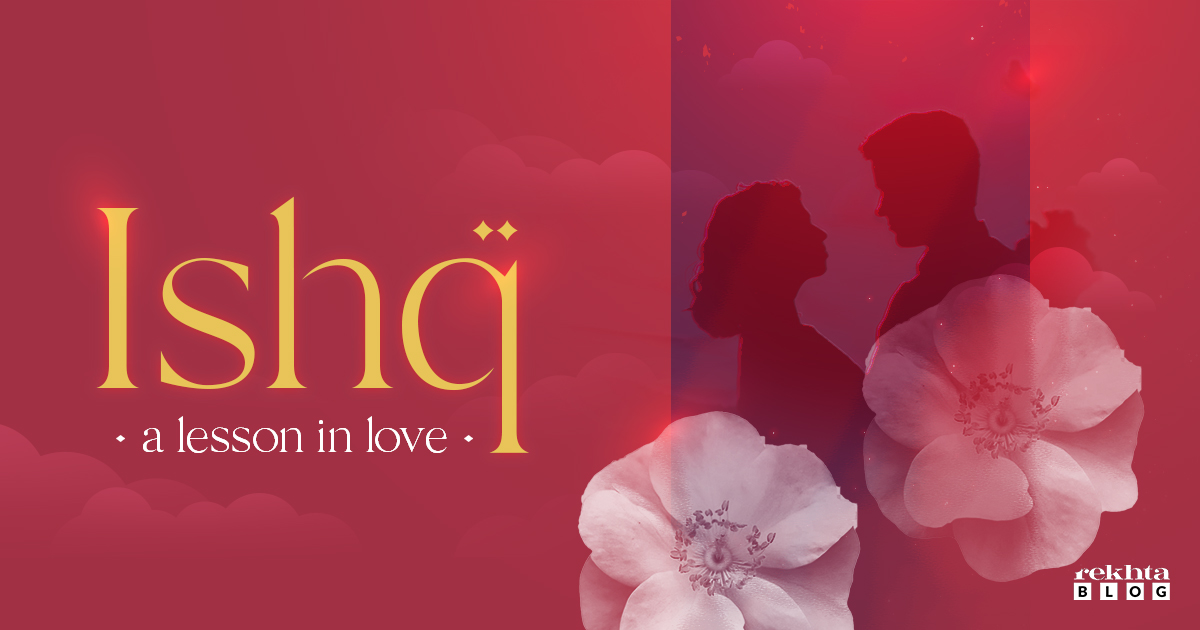
Ishq: A Linguistic Lesson in Love
Aql goyad shash-jihat hadd-ast-o-bairuu.n raah niist
Ishq goyad raah hast-o-rafta’am man baar-haa
Intellect says, “The Cosmos is the limit and there’s no trail beyond”
Passion says, “Trail there is, and that, I’ve traversed ad infinitum”
Maulana Rum
For the Sufi, it’s the very edge of intellect; for the lover, it’s the peak of passion; for the believer, it personifies the Supreme; for the skeptic, it transcends the Divine. Ishq, a word that encapsulates all of mind, matter, and beyond, is an expression we know all too well.
But as it happens so often, when you look at a word from a lexical standpoint – charting its usage and course of evolution – you discover novel ways of identifying yourself with it.
At the risk of stating the obvious, I dare to spell out what Ishq generally connotes: passion, love, amor.
You might already be knowing that much, but let’s move on and explore this sacred word in intimate detail.
The word Ishq has been derived from its Arabic cognate ‘Ashiqa (عشقه) which is a kind of ivy or Bel, as we refer to in Hindi. But this is not just any creeper growing around. This clinging plant is actually a parasitic plant – similar to the mistletoe – that actually wraps up around another plant and eventually dries it out completely, to the extent that the original plant dies and only the passion-vine (ivy) remains.
Ask yourself, on the back of this newfound context, what is Ishq?
It is the phenomenon that dries up the plant and makes it parched, and ultimately, extinct.
Does this ring a bell? Isn’t this what Ishq is all about: giving one’s essence away to another entity?
If your answer is yes, stay with me on this chain of thoughts. Let’s recourse to poetry for a moment; have you heard of the motif Fanaa? Literally, it means death, destruction, or obliteration; metaphorically, poets use it to signify the ultimate price they are willing to pay to attain the beloved’s union.
In crude Sufi thought, however, Fanaa is annihilating one’s selfhood for the Divine, i.e., Fanaa-fi-Allah, which means becoming so absorbed in the Supreme that the subject enters mental oblivion, or as we say in Sanskrit, Talleen (Tat mein leen) Ho Jaana/experiencing Shuunyata (singularity, in physics).
Fanaa, as you’d notice, has overtones of death, as in the lover slaying his subjectivity (i.e., I-am-ness) and embracing Be-Khwudi for the object (The Divine), and climactically, becoming One.
On that note, let’s turn our attention to the Hindustani side of things. Do you know we’ve got an indigenous creeper of our own that’s precisely the ‘Ashiqa in Arabic? It’s called Ishq-Peche, or Ishq-e-Pechaan in Urdu, literally, the creeping/coiling vine (LipaTne Waali Bel).
A case in point is this verse by Aatish showing exactly what we talked about above:
jis se lipTaa suukha majnuuñ kī tara se vo darakht
ʿishq-peche par mujhe shak hota hai zanjiir ka
Like Majnun, every tree that it coiled around, became barren
On the shackle*, I have doubts about being the passion-vine
*Majnun is famous for having his feet shackled, and that has been allegorically made parallel to the passion vine here.
But there is one last twist to this love story, and that is Amar-Valli – the Sanskrit equivalent to this passion vine we are talking about.
More commonly known as Amar-Bel, it’s called so because wherever it grows, it continues growing forever.
Now, draw parallel the meaning of Ishq we explored above against this Amar-Bel; the former, about drying up and dying; the latter, about thriving and living forever.
Notice a contradictory similarity between them? Two words as similar as they could get in what they mean, but also as apart as life and death! What do you call such an equanimous antithesis?
Ishq.
The only word so pregnant with meaning that it could capture all the contradictions with complete consonance. Want to know what effect in terms of meaning this cross-lingual-cross-cultural interplay produces?
Ishq, like the Amar-Bel, symbolizes the highest state of passion that overcomes the lover, inspires him to destroy his base, worldly self, and finally, catapults him into becoming one with the Indestructible (Divine). Concisely, Ishq is what renders you lifeless, making you immortal.
Lastly, leveraging Rumi’s words from the first couplet: Shah-Jihat Hadd-ast (The six directions are the limit) – Ishq and Ishq alone can break this illusory time-space continuum and unlock a whitespace that’s all too sacred for our ideas to penetrate.
Here’s one last couplet, and perhaps the best you’ll find in all of Urdu poetry, by Meer, enveloping everything we’ve learned about Ishq so far:
Daagh-e-dil-e-kharaab shabon ko jale hai ‘Meer’
Ishq is kharaabe mein bhi charaagh ik jalaa gaya
At night, the ruined heart’s scar, burns and burns, oh Meer!
Even in this desolation, passion left kindling one solitary lamp
That’s Ishq, for everyone trying to understand the nature of all the unexplainable stuff that’s going around!
And don’t forget to let us know in the comments below if the piece helped you reacquaint yourself with this impassioned force.
NEWSLETTER
Enter your email address to follow this blog and receive notification of new posts.




